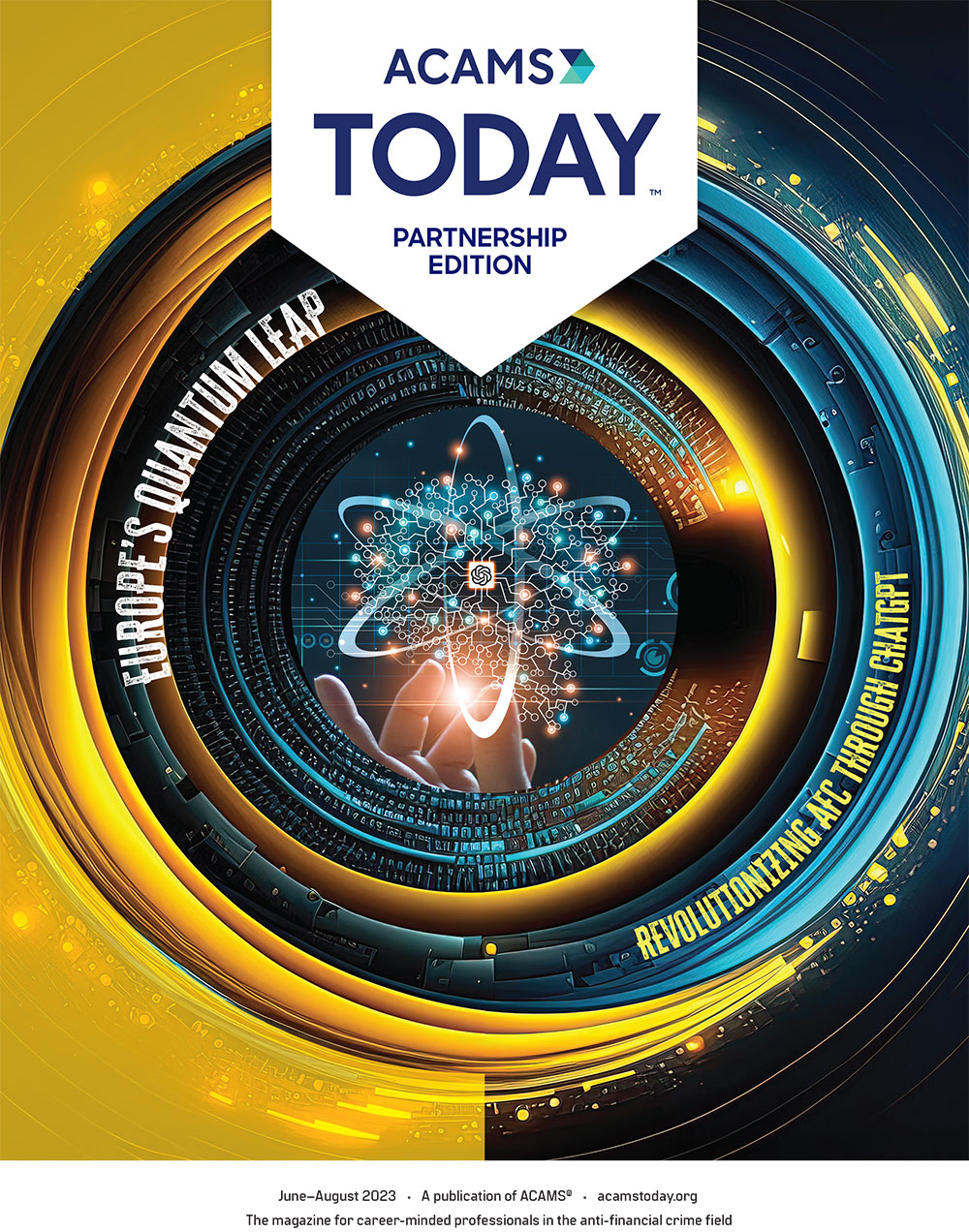Featured
Europe’s Quantum Leap
In December 2020, the University of Science and Technology of China broke all records when its photonic quantum computer “Jiuzhang” achieved the mammoth task of carrying out a Gaussian boson sampling—a quantum computational task too formidable for classical computers—in mere 200 seconds, an effort that would have taken Fugaku, the world’s fastest supercomputer, 600 million years to complete.
Revolutionizing AFC Through ChatGPT
Integrating ChatGPT into current anti-money laundering (AML) techniques is a novelty and a controversial issue. ChatGPT was created by OpenAI in 2020 and it is a powerful artificial intelligence (AI) model that uses natural language processing to understand and generate human-like responses.
From the Editor
Transforming AFC Through Innovative Technology
I am delighted to bring you an exciting topic in this edition: The transformative potential of quantum computing in the realm of anti-financial crime (AFC). As technology continues to evolve, we find ourselves at the forefront of a new era that promises revolutionary advancements in combating financial crimes more efficiently than ever before.
Inside this Edition
- AFC Challenges
- AFC Policy
- Community Banking Corner
- Compliance
- Global Financial Crime Review
- Know Your Chapter
- Meet the ACAMS Staff
- Member Spotlights
- Practical Solutions
Rugged
As investors and speculators continue to try cryptocurrency, bad actors continue to reinvent fraudulent schemes. A report from Solidus Lab highlighted recent trends in crypto scams, specifically the ever-growing rug pull. By definition, a rug pull is a type of crypto scam that occurs when a developer or creator advertises and markets their project’s token or coin before disappearing with the funds.
Money Laundering Enablers and Global AML/CTF Frameworks
Banks are often unwitting enablers of financial crime, but at the same time, they are our strongest defense against financial crime as gatekeepers of the financial system. Regulators hold banks accountable for complying with ever-increasing and complex regulatory requirements.
Remote Work and Information Privacy
The COVID-19 pandemic has caused a significant shift in the way we work, with the rise of remote work being one of the most notable changes. With many offices and workplaces shutting down or limiting capacity, companies were forced to adopt remote work to continue their operations, resulting in an increased reliance on technology and digital communication tools such as video conferencing, instant messaging and project management software.
The Metaverse’s Darkverse: Potential Ramifications
In its current state, the metaverse is still a concept being developed with high amounts of evolution needed in order to create an interconnected virtual world. However, the metaverses available now allow us to preview what an immersive virtual world may look like in the future.
Social Media and Regulatory Compliance
WhatsApp has more than 2 billion users across the globe. That translates to over 100 billion messages a day and over 200 billion minutes on voice and video calls. In recent years, though, its ease of use and universal reach has presented the financial services industry with a significant—and expensive—compliance problem.
FinCEN’s Proliferation Financing Prevention and Mitigation Policies
The article titled “FinCEN’s AML and Terrorist Financing Priorities: An Introduction,” featured in the ACAMS Today Jun-Aug ’22 edition, shared general thoughts, basic definitions and practical examples on each of the national anti-money laundering (AML) priorities. This article, the eighth of the series, will discuss proliferation financing in greater detail.
AI in KYC for Community Banks
Know your customer (KYC) is a familiar topic for all banks, regardless of size. Traditionally for community banks, this was one of the easier blanks to fill in. Being local generally meant a community banker knew their customer personally or at least through easily verifiable means. There is a comfort level to an understanding with relative ease of the expected activity and background of new customers onboarded at a community bank in a traditional setting.
Crypto Kaleidoscope
Many people are both compelled and confused by crypto. This is understandable as it is difficult to aurally reconcile the cacophony from critics, the Muzak from adherents and white noise generated by industry buzz and coin offerings, which are estimated at upwards of 20,000.
Europe’s Quantum Leap
In December 2020, the University of Science and Technology of China broke all records when its photonic quantum computer “Jiuzhang” achieved the mammoth task of carrying out a Gaussian boson sampling—a quantum computational task too formidable for classical computers—in mere 200 seconds, an effort that would have taken Fugaku, the world’s fastest supercomputer, 600 million years to complete.
Victims of Terrorism Should Look Toward the USVSST Fund
As members of the anti-financial crime (AFC) community, AFC professionals have worked on cases seeking to hold terrorists and their supporters liable for their actions in U.S. courts. Many AFC professionals are dedicated to finding official Iranian assets, and others to prevent terrorism on U.S. victims.
Responding to the Emotional Impact of Fraud
Understanding the emotional reactions of victims is crucial to aiding the emotional and financial recovery of fraud victims, and FIs have some important responsibilities in working with fraud victims by adopting a victim-centered approach. According to the Centre for Counter Fraud Studies’ (CCFS) research, fraud victims expect the following priorities as a response to their experience of fraud.
New OFAC Licenses Facilitate Humanitarian Transfers
What began as a series of puzzling anecdotes about the inexplicable and abrupt closure of nongovernmental organizations’ (NGOs’) bank accounts has ballooned into the global phenomenon known as bank “de-risking”—where financial institutions (FIs) shed, rather than manage, any perceived risk in line with a risk-based approach. Its prevalence and impacts on NGOs have been well-documented.
Partnerships Are Key in the AFC Combat
Law enforcement (LE) in the U.S. is aware that financial crimes are increasing yearly and is taking a proactive approach through collaborative efforts such as private-public partnerships and partnerships between LE agencies.
The Devastating Effects of Fentanyl Trafficking
Fentanyl is a powerful synthetic opioid drug used for analgesic (pain relief) and anesthetic purposes in both human and veterinary medicine, in addition to treating patients with severe or chronic pain. Launched in 1963 by Janssen Pharmaceuticals, founded by Belgian Dr. Paul Janssen, fentanyl is the most widely used anesthetic in the world. It is estimated that fentanyl is 100 times more potent than morphine and 50 times more potent than heroin.
Preventing Crypto-related Crime in Latin America
In the Latin America region, efforts to combat financial crimes must consider contextual factors, such as poverty, financial education, internet access, corruption and impunity. For governments facing these contextual challenges, cryptocurrencies may add another layer of complexity, regardless of the regulatory approach in that country.
China-Based Money Laundering Organizations and the BMPE
For decades, the Black Market Peso Exchange (BMPE) has been widely regarded as the most extensive, successful and efficient money laundering system. The last several years have witnessed the prominent rise of China-based money laundering organizations and their inclusion into the BMPE.
Get to Know Michael Fasanello
In 2023, the ACAMS Pittsburgh Chapter had a chance to add new anti-financial crime (AFC) experts to their board. This interview provides the opportunity to get to know one of the new board members, Michael Fasanello, who is the crypto compliance officer at AnChain.AI.
Appreciating LE Professionals and Partners
While the COVID-19 pandemic may have put a damper on how we have shown our appreciation to law enforcement (LE) in recent years, the ACAMS Greater Omaha Chapter’s 2023 Law Enforcement Appreciation lunch and panel presentation was one for the books!
Juan Ravelo: Collaboration and Expansion Through Marketing
ACAMS Today spoke to Juan Ravelo about his career as marketing manager at ACAMS for the past four years. Ravelo is a seasoned marketing professional with over 12 years of experience in the financial services, higher education and consultancy industries. Currently, he leads the global anti-money laundering membership marketing efforts for ACAMS, impacting over 50,000 members in 175 countries.
Éric Lachapelle, CAMS, CFA, CPA, CRCP—Montreal, Canada
Éric Lachapelle is a partner in Regulatory Compliance and a national leader in the Financial Crimes department at KPMG in Canada. He is recognized by the industry and his peers as an expert in anti-financial crime, including fraud, anti-money laundering, corruption, economic sanctions, the common reporting standard and the Foreign Account Tax Compliance Act, as well as compliance and risk management.
William “Willie” Rondon—Washington, D.C., USA
Two teams—conveniently named Branch A and B—comprise the Internal Revenue Service Criminal Investigation’s (IRS-CI) International Operations Team. William “Willie” Rondon serves as the Branch B director. He oversees a team of regional attaches in Latin America, the Caribbean, Asia and Eastern Europe who work with foreign governments to build partnerships, train law enforcement counterparts and investigate financial crimes.
Ray Villanueva, CAMS—Florida, USA
Raymond “Ray” Villanueva, CAMS, is the director of investigations at Kaufman Rossin. He has more than 29 years of law enforcement and investigative experience, with an emphasis on the Bank Secrecy Act, anti-money laundering, trade enforcement, sanctions and anti-fraud, as well as international collaboration and information sharing.
The Potential Perils of Online Gaming
Online video games have become a popular pastime for people of all ages. However, with the evolution of the gaming industry, exposure to financial crimes is rapidly increasing. The rise of virtual economies and the increasing value of in-game items and currencies have made it more appealing for criminals to use microtransactions and loot boxes in video games to launder money.
Revolutionizing AFC Through ChatGPT
Integrating ChatGPT into current anti-money laundering (AML) techniques is a novelty and a controversial issue. ChatGPT was created by OpenAI in 2020 and it is a powerful artificial intelligence (AI) model that uses natural language processing to understand and generate human-like responses.







